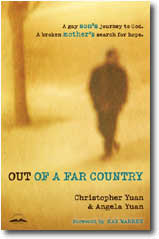The Church and Post-Abortive Heartache
Since Roe v. Wade, the American church has famously (and sometimes infamously) spoken out against abortion. Its effort has resulted in education, resources and saved lives, (and anger, of course). But abortion is the most common surgical procedure in the country*. What is the church's response to the women (and men) affected by the 1.2 million abortions a year?
Since Roe v. Wade, the American church has famously (and sometimes infamously) spoken out against abortion. Its effort has resulted in education, resources and saved lives, (and anger, of course). But abortion is the most common surgical procedure in the country*. What is the church's response to the women (and men) affected by the 1.2 million abortions a year?
Approximately one third of the female population in the U.S. has had or will have an abortion, and almost half of those will experience more than one. Though society promotes abortion as a way to avoid negative consequences, most women endure emotional, psychological, physical and/or relational consequence after their abortion.
Many post-abortive women feel conned. Before the abortion, friends made noble speeches about a woman's rights. If she told them, her family may have talked about the bright future she couldn't give up. The child's father may have used their relationship as a reason to terminate the pregnancy. Supportive abortion clinic counselors assured them this was just a blob of tissue.
But that was before the abortion. Afterward, society's stigma kicked in. She'd tried to escape judgment about her pregnancy, and is now faced with harsher judgment over her abortion. Her family may be cooler to her, or refuse to talk about it. Statistically, her relationship with the baby's father ended soon after the abortion. And the supportive counselors can't be found when she wonders why she's grieving and depressed if it was "only a blob of tissue."
Many post-abortive women are crippled by guilt and held hostage by their secrets. Others struggle when their minds truly believe that it wasn't a baby yet, but their hearts darken anyway. Many turn to drugs, alcohol, eating disorders or self-sabotaging behavior. Some throw themselves into overachievement or good works. Others, into exotic dancing or prostitution. Some feel they deserve God's punishment, and would certainly never be loved by him again. Many feel hopeless, unlovable, unforgivable.
But we know better. Guilty sinners shackled by fear, isolation and darkness? That's the church's clarion call. Whether the sins are the same as ours or not, every one of us was hopelessly drowning in our guilt before Jesus raised us through his grace. And now we get to pass on the message of mercy and hope and healing.
Churches can offer counseling or confidential Bible studies for abortion recovery for both women and men. Post the notices online and in places where non-churched people will see them. Pastors who preach on abortion can temper their sermons with grace for those who've already gone through it. Finally, remember that one third of almost any female population has experienced an abortion. This includes those in your church, who may be even more hidden, guilt-ridden and works-oriented than non-churched women. Abortion should not be treated as the unspeakable or unforgivable sin. These women, and the church as a whole, needs to be reminded that no sin is bigger than God's grace.
The church's role in the abortion issue doesn't end at the front doors of the clinic. I believe we're more effective if we're waiting at the "back door" with love and acceptance and the Gospel of Jesus.
* Statistics from Her Choice to Heal by Sydna Masse



3 Comments
Sue Bohlin
The Dark Underside of Abortion
Thanks for shining a compassionate light on this painful secret that plagues so many women (and men!), Laura. I wrote an article on post-abortion syndrome for Probe Ministries called "The Dark Underside of Abortion" that provides additional information.
May those burdened by the shame and guilt of abortion find grace to receive forgiveness and acceptance from God and His people, and may the rest of us be grace-givers who understand that post-abortive women are a "bruised reed He will not break" (Is. 42:3).
Gail Seidel
Thank you, Laura
You have clarified so well the truth of abortion – the pain AND the need we have as a church to respond with support and help and compassion. Thank you!
Tara Lillitch
Moving Article
Absolutely right, Laura.
It's much better to come across with kindness than with judgement, especially to folks who are in the most need of help and support.